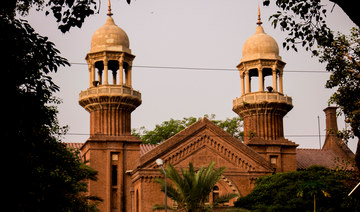KARACHI: Pakistan’s largest private utility Hub Power Co. Ltd. (Hubco) expects power consumption in the country to fall again this year due to higher tariffs and tepid industrial activity, a top executive told Reuters.
Power demand in Pakistan plunged last year by nearly a sixth and a decline in 2024 would mark the first time in 16 years that annual electricity use has fallen consecutively, data from energy think tank Ember showed.
“There is demand destruction on the industry side because the industry unfortunately is not growing,” Hubco Chief Financial Officer Muhammad Saqib told Reuters on the sidelines of the Energy Summit 2024 conference in Karachi.
Power consumption is a significant economic indicator in the developing economy and the expected decline this year underscores challenges facing the newly elected government in debt-laden Pakistan, amid growing discontent among the poor.
“Because of the significant increases in consumer tariffs, people obviously save on fuel trying to conserve energy,” Saqib said.
Poor and middle class households are still feeling the impact of the International Monetary Fund’s bailout of Pakistan last year, which contributed to rising retail prices including fuel and electricity charges.
Power cuts are also frequent in Pakistan, especially in far flung rural areas, due to grid issues, delays in importing fuel and hard currency shortages, though the frequency of such outages have reduced in the recent months.
Saqib said he expects a failure to carry out long-pending upgrades to Pakistan’s electricity grid would continue to contribute to inefficient power supply patterns, including the use of expensive and more polluting furnace oil despite availability of cheaper alternatives such as natural gas.
“There is no reason to use any furnace oil because Pakistan has ample capacity of imported LNG (liquefied natural gas). But because of grid constraints, we have to use furnace oil this summer also,” he said.
Pakistan has been trying to cut down on using furnace oil for power generation and boost natural gas-fired electricity production.
Saqib said grid constraints will also likely curb coal-fired power generation and hence coal imports.
Hubco’s own power plants would require 3.5 million metric tons of imported coal a year if power plants run at full capacity, but the company does not foresee imports exceeding 750,000 tons this year, he said.
“There is not enough capacity in the transmission lines to actually use those imported coal plants, although they’re at times cheaper than LNG-fired power.” Saqib said.
Pakistan’s biggest private utility forecasts power demand will fall in 2024
https://arab.news/gtgcj
Pakistan’s biggest private utility forecasts power demand will fall in 2024
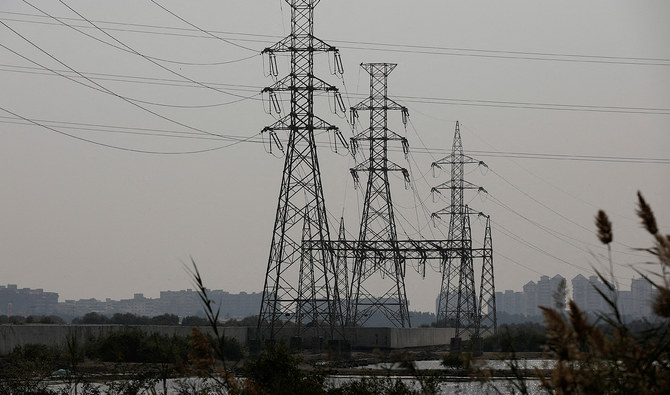
- Pakistan power demand plunged last year, decline in 2024 will mark first time in 16 years that annual electricity use has fallen consecutively
- Power consumption is a significant economic indicator in Pakistan and expected decline this year underscores challenges to new government
For the first time, Khyber Pakhtunkhwa unveils $6.3 billion budget ahead of federal government
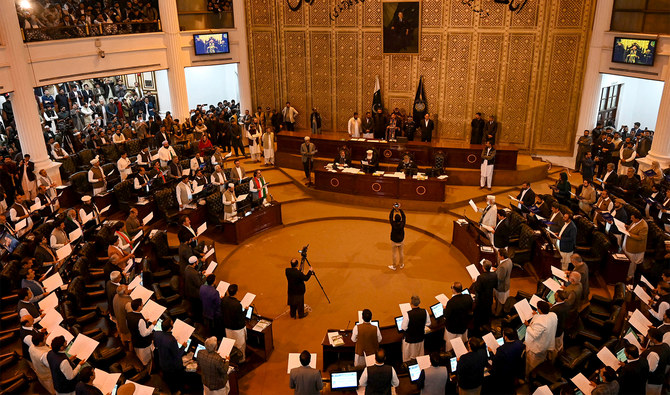
- Critics say the move will further deepen the trust deficit between the provincial and federal authorities
- KP finance minister says the province did not get its due share in revenue, faced $499.08 million deficit
PESHAWAR: For the first time in history, Pakistan’s northwestern Khyber Pakhtunkhwa (KP) province on Friday announced its budget of Rs1,754 billion ($6.3 billion) before the federal government, with one of its senior officials justifying the move on the basis of provincial autonomy.
The KP government is led by former prime minister Imran Khan’s Pakistan Tehreek-e-Insaf (PTI) party, whose administration in Islamabad was ousted from power following a parliamentary no-confidence vote in April 2022.
Since then, its leadership has struggled to stay politically afloat, with many of its members, including Khan, being incarcerated for several months in multiple legal cases. The PTI is now in the opposition at the center, where its lawmakers frequently clash with members of the treasury benches in a deeply polarized environment.
Speaking to Arab News, KP finance minister’s media officer, Anwar Khan Khattak, said a province could present its own budget after the 18th amendment, which ensures autonomy to all federating units.
“We are not in competition either with provinces or the federal government,” he said. “We have our own exclusivity in terms of governance. That’s why we took a lead in presenting our budget.”
“A province only needs the federal government’s assistance in achieving tax targets,” he added.
However, Asmat Shah, a Peshawar-based journalist and expert on economic affairs, said provinces presented their budget after the federal government, saying the KP government’s decision to do the opposite would only widen the trust deficit with the administration in Islamabad.
“The only logic I see behind KP’s move to present the budget before the federal government is that it wants to demonstrate efficiency to its voters,” he maintained. “Secondly, the PTI-led government wants to show the masses it is not dependent on the federal authorities while making critical decisions.”
Criticizing the budget itself, Shah said that the provincial government should have allocated more funds for security, education and health sectors, which were badly affected due to years of militancy in the region.
Earlier, KP’s finance minister Aftab Alam unveiled the budget in the provincial assembly.
“The total outlay of the budget is Rs1,754 billion,” he said. “Mr. Speaker, development expenditures have a lead role for people’s prosperity and development of the province. Development expenditure not only enhances people’s life standard but creates job opportunities to move the economy in tandem. Rs416.30 billion ($1.49 billion) has been allocated for development expenditures for the fiscal budget 2024-25.”
Alam also criticized the federal authorities for not providing the province’s due share in revenue.
“Mr. Speaker, it is to be mentioned that following the merger of erstwhile tribal districts into KP, the province has a total Rs262 billion ($940.72 million) annual share in the NFC [National Finance Commission] award but the province has received only Rs123 billion ($441.64 million),” he added. “Keeping in view this, KP is facing an annual deficit of Rs139 billion ($499.08 million).”
Pakistani court summons intelligence officials over alleged abduction of Kashmiri poet

- Family of a Kashmiri poet, Ahmad Farhad, accused the ISI after he went missing from his Islamabad residence
- The court asks if any intelligence official was recently prosecuted for blackmailing, phone tapping or harassment
ISLAMABAD: A Pakistani court on Friday summoned senior officials from the country’s spy agencies, along with top defense and interior ministry officials, in a case related to the recovery of a missing Kashmiri poet, Ahmad Farhad.
The alleged abduction of the poet from his Islamabad residence last week brought the Islamabad High Court (IHC) face to face with the executive, following Justice Mohsin Akhtar Kayani’s critical remarks about the conduct of these agencies.
This happened after the poet’s family accused Pakistan’s top spy agency, Inter-Services Intelligence (ISI), of abducting Farhad due to his critical social media posts targeting the army. The Pakistan military has not commented on the claims and has always denied suppressing dissident voices.
The high court had directed the authorities in the previous hearing to produce the missing poet by today, Friday, warning it would otherwise summon senior government functionaries. The court also criticized Pakistani intelligence agencies, which have frequently faced such allegations in the past, prompting the law minister to say on Monday the court’s comments were “shocking.”
“All relevant people, including the law minister, secretary of the interior, secretary of defense, sector commander of ISI, sector commander of MI [Military Intelligence], and director of IB [Intelligence Bureau], are ordered to appear in court at the next hearing,” an eight-page court order written in Urdu proclaimed.
The court deferred the hearing until May 29, saying if the missing person was recovered before that, a written report should be submitted.
The court also demanded to know about the accountability mechanism within the agencies that activates when officials are found involved in illegal activities.
“In the last year, if officials from ISI, IB and MI were found involved in illegal detention, blackmailing, phone tapping or harassment of any person, what action was initiated against them and how many officers were given punishment,” it asked.
In one of the previous hearings, Justice Kayani also ordered the Islamabad Police to record the ISI sector commander’s statement in the missing person’s case.
“Now, the ISI sector commander’s statement will be recorded in the missing person’s case. A police officer will record his statement and write it,” the judge ordered.
He also asked if there was any precedent where an intelligence officer was prosecuted in the past.
“This immunity that has been granted must come to an end,” he continued.
Pakistan retains pacer Haris Rauf in T20 World Cup squad

- The tournament will run from June 1 to June 29 and be jointly hosted by the United States and West Indies
- Pakistan’s Group A includes arch rivals India, and the team will face the United States in their first match
KARACHI: Pakistan retained fast bowler Haris Rauf when announcing on Friday their 15-man squad for the Twenty20 World Cup, despite doubts over his fitness and lack of match practice.
The 30-year-old injured his shoulder during Pakistan Super League in February and is expected to play in the second Twenty20 international in Birmingham on Saturday – his first outing since recovery.
Pakistan Cricket Board’s selection committee said Rauf is fit and raring to go.
“Rauf is full fit and bowling well in the nets,” said a PCB release. “It would have been nice if he had gotten an outing in the first match at Headingley but we remain confident that he will continue to maintain an upward trajectory in the coming matches.”
The Headingley match between Pakistan and England was abandoned due to rain.
Pakistan is the 20th and the last team to announce the squad as they continued to search for combination since their 2-2 series draw at home against New Zealand last month.
Babar Azam will lead the squad in the World Cup, his third T20 World Cup as skipper.
The tournament will run from June 1 to June 29 and be jointly hosted by the United States and West Indies.
Teams are divided in four groups of five with the top two teams qualifying for the Super Eight Stage in which all matches will be played in the West Indies.
Pakistan’s Group A includes arch rivals India as well as Canada and Ireland.
Pakistan will face United States in their first match in Dallas on June 6.
Fast bowler Hasan Ali, as well as batters Agha Salman and Muhammad Irfan Khan were left off the squad.
Fast bowler Mohammad Amir – the only survivor of Pakistan’s 2009 Twenty20 World Cup triumph – is meanwhile staging a comeback after coming out of retirement two months ago.
He is part of a strong pace attack spearheaded by Shaheen Shah Afridi, Rauf, Naseem Shah and Abbas Afridi.
Pakistan lost in the semifinal of the 2021 Twenty20 World Cup in the United Arab Emirates and in the final in Australia in 2022.
Squad: Babar Azam (captain), Mohammad Rizwan, Saim Ayub, Fakhar Zaman, Usman Khan, Azam Khan, Iftikhar Ahmed, Imad Wasim, Shadab Khan, Mohammad Amir, Shaheen Shah Afridi, Naseem Shah, Abbas Afridi, Haris Rauf, Abrar Ahmed.
Pakistan enhances oversight of Hajj services as pilgrims continue to arrive in Saudi Arabia
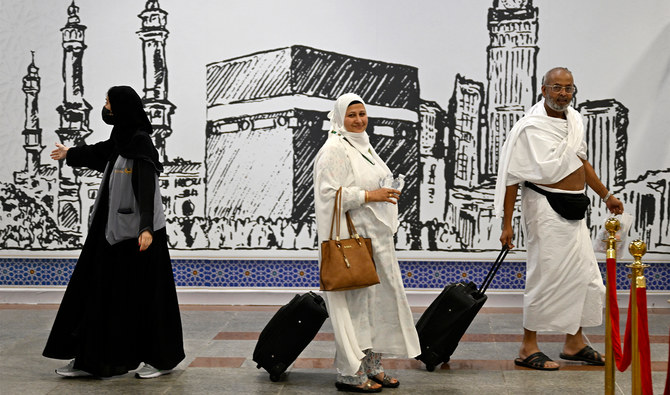
- Pakistan’s Hajj mission says heavy fines will be imposed in case of poor services by contractors
- The authorities have rented 141 residential buildings in Makkah to facilitate Pakistani pilgrims
ISLAMABAD: A senior official at Pakistan’s Hajj mission in Saudi Arabia said on Friday the authorities had put a robust evaluation system in place to assess the performance of support staff and service providers who were engaged to address the needs of the pilgrims.
The mission’s accommodation and transport director, Asghar Ali Yusufzai, told the state-owned Associated Press of Pakistan news agency the government would provide all possible facilities to Pakistani pilgrims, who are gradually beginning to reach Makkah to perform Hajj.
Yusufzai said there was zero tolerance for any negligence in performing duties, adding that everyone, including Hajj volunteers and contractors providing food, transport, and accommodation services, were required to give their best.
“There is a complete accountability system in place to check the accommodation, food, and transport services,” he continued. “Heavy fines will be imposed in case of any breach of agreement or poor service.”
He informed the Hajj mission had so far rented 141 residential buildings in three localities, including Al-Azizia, Batha Quraish and Al-Naseem neighborhoods. It had also engaged nine catering companies, out of which five had already started providing three-time quality meals to the pilgrims.
Yusufzai said 275 latest buses had been arranged for the movement of Pakistani pilgrims from the airport to their accommodations, for five-time prayer in the Grand Mosque and for other Hajj-related travel between Mina, Arafat, and Muzdalifah.
He informed there would be around 550 Hajj support staff from Pakistan in the kingdom by the end of the month when the number of pilgrims reaches almost the capacity.
‘Victory for the oppressed’: PM Sharif hails ICJ verdict against Israel’s war, seeks swift implementation
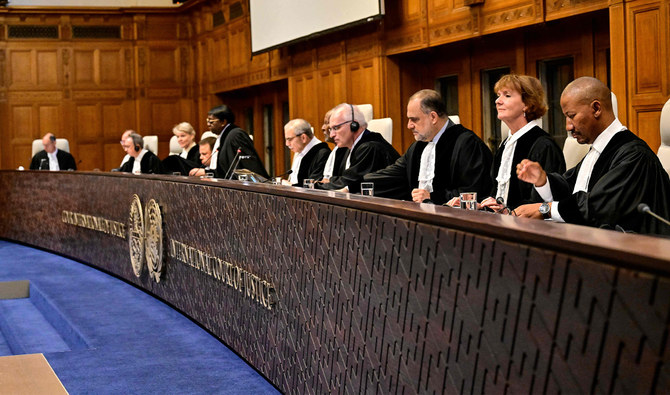
- ICJ asked Israel to halt military operations in Rafah in a case filed under the 1948 genocide convention
- Sharif paid tribute to the judges who issued the verdict, saying their decision would pave way for peace
ISLAMABAD: Prime Minister Shehbaz Sharif on Friday welcomed the decision of the International Court of Justice (ICJ) directing Israel to stop its military operations in the southern Gaza city of Rafah, calling it a “victory for the oppressed” and advocating for its swift implementation.
The ICJ case against Israel was initiated by South Africa in December 2023, where it labeled Israel’s actions in Gaza as “genocidal,” asserting that they intended to destroy the Palestinian people in ways specified under the 1948 genocide convention.
Israel besieged the Gaza Strip and launched airstrikes following a surprise attack by Hamas on October 7, prompted by the deteriorating conditions of the Palestinian people living under occupation.
To date, the Palestinian death toll has reached about 36,000, predominantly women and children, as Prime Minister Benjamin Netanyahu’s administration continues its military campaign that has demolished hundreds of residential neighborhoods along with hospitals and educational institutions.
“The implementation of the International Court of Justice’s decision to halt operations in Rafah will pave the way for peace in the world,” the prime minister was quoted as saying in a statement released by his office, as he paid tribute to the judges who issued the verdict.
“Pakistan supported South Africa’s petition and will continue to advocate for all Palestinians,” he added. “The decision is a victory for the oppressed, and it must be implemented immediately.”
Sharif called for the opening of routes to Gaza to provide immediate food and medical supplies to its residents.
The ICJ verdict said that a UN investigative commission should be granted immediate access to Gaza and Rafah, likely mounting further international pressure on an increasingly isolated Israel to curtail its war.
Criticism of Israel’s conduct in the war in Gaza intensified in recent months, with its key ally, the United States, cautioning it against invading Rafah.
Responding to the ICJ verdict, Israel said its campaign had not led to “the destruction of the Palestinian civilian population” in Rafah, adding it would continue to allow aid to enter Gaza “in accordance with the law.”



